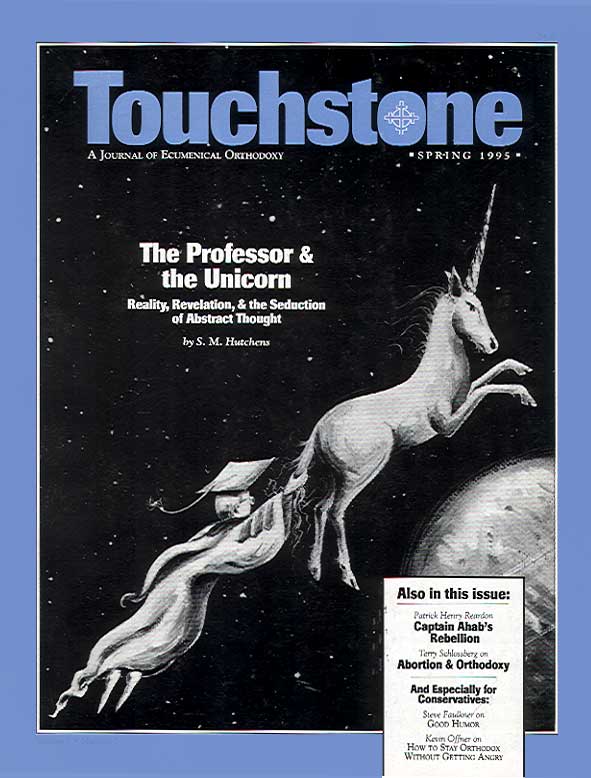Captain Ahab’s Rebellion
A Novelist Looks at Predestination
by Patrick Henry Reardon
Back in 1923, just when Herman Melville was finally coming to be regarded as one of America’s major literary figures, but still quite a while before Albert Camus dared name him “among the greatest geniuses of the West,”1 his most famous novel was subjected to a passing analysis by Aldous Huxley: “It always seems to me that Melville often defeated his own ends in Moby Dick by protesting too much. . . .”2 Whatever one may think of this as a stylistic criticism, there is no doubt that Moby Dick is a work heavy with protest. Indeed, it is almost nothing but the account of a protest, even a rebellion. While he was still writing it, Melville told his fellow seafaring author, Richard Henry Dana, that it would “be a strange sort of book,”3 and he elsewhere remarked that he could not recommend the story to just anybody.4
The protest in this novel is theological, and the great protester is Captain Ahab, metaphysical rebel against the divinely appointed conditions of existence, challenging “the insufferable splendors of God’s throne,” “consumed with one unachieved revengeful desire,” convinced that “right worship is defiance,” and uttering the sacrilegious doxology: “Oh, thou clear spirit, of thy fire thou madest me, and like a true child of fire, I breathe it back to thee.”
Before looking at the cause of the sea captain’s complaint and the nature of his rebellion, we do well to remark that Ahab is not Melville himself, who speaks more properly through the book’s narrator, Ishmael. The critic Randall Stewart sagely observed that Melville did not necessarily approve of Ahab, “any more than Shakespeare necessarily approved of Macbeth, or Milton of Satan.”5 Indeed, Melville’s truer voice, the narrator Ishmael, repeatedly describes Ahab’s quest as monomaniacal and insane.
As we shall see, however, if Ahab is not Melville, he certainly is a voice coming from inside Melville, who will take care that this voice of protest is granted a full and proper hearing. I will argue, besides, that Melville is not really convinced that the old sea captain is altogether wrong. Even Ishmael, by preference a disciple of Rousseau and sharing his optimism about the native innocence of human beings, cannot disregard the suspicion that a deep, inveterate evil lies at the heart of things, so that Ahab’s hopeless rebellion may be, at the last, the more truly honest course.
The Nature of the Complaint
Ahab’s protest has been credited to various causes. Henry A. Murray, for example, regarded him as Melville’s voice of rebellion against the repressive ethics of Calvinist Christianity.6 There is some merit to this approach, given Ishmael’s views on the superiority of pagan innocence over the dubious virtue of most Christians whom he knew. The narrator’s assessment certainly represents Melville’s own view, and it was clearly on his mind at that period. For example, his novel Pierre, published the following year (1852), is largely a critique of what he considered the baneful influences of Christian idealism.7 I hope to show that a certain aspect of Calvinism is a significant factor in Ahab’s complaint, but it is not Calvinist ethics.
However, Ahab is certainly protesting a great deal more than a particular religious system. He rebels against the very structure of human existence, challenging the validity of metaphysics and religion altogether. The operative query in this book was posed by Ahab’s second officer, Stubb: “I wonder, Flask, whether the world is anchored anywhere.” This strictly metaphysical and even theological question, this wonder about the anchoring of reality, is Melville’s very own, reflected just a few years later (1856) in Nathaniel Hawthorne’s well-known description of a recent visit from him:
Melville, as he always does, began to reason of Providence and futurity, and of everything that lies beyond human ken, and he informed me that he had “pretty much made up his mind to be annihilated”; but still he does not seem to rest in the anticipation; and, I think, will never rest until he gets hold of a definite belief. . . . He can neither believe, nor be comfortable in his unbelief; and he is too honest and courageous not to try to do one or the other. If he were a religious man, he would be one of the most truly religious and reverential; he has a very high and noble nature, and better worth immortality than most of us.8
He could neither believe nor rest in unbelief. Everything was to be doubted, even the value of doubt itself. Thus, Melville’s spokesman, Ishmael, endeavors to maintain on metaphysical questions the perfectly open mind of the skeptic, “that strange perplexity of inert irresolution,” as he watches the perilous rebellion of Ahab. On the book’s first page Melville tells us that the silence of the letter “h” in the pronunciation of “whale” is no accident; by pointing to something that is not really there, by both existing and not existing, it “almost alone maketh up the signification of the word. . . .” Likewise, the very lack of a distinct color in the hated white whale “shadows forth the heartless voids and immensities of the universe, and thus stabs us from behind with the thought of annihilation,” so that “stricken Ahab stood . . . with a crucifixion in his face; in all the nameless regal overbearing dignity of some mighty woe,” with his “aspect of nailed firmness, only dashed with a certain wild longing, if not hopefulness.”
Patrick Henry Reardon is pastor emeritus of All Saints Antiochian Orthodox Church in Chicago, Illinois, and the author of numerous books, including, most recently, Out of Step with God: Orthodox Christian Reflections on the Book of Numbers (Ancient Faith Publishing, 2019).
bulk subscriptions
Order Touchstone subscriptions in bulk and save $10 per sub! Each subscription includes 6 issues of Touchstone plus full online access to touchstonemag.com—including archives, videos, and pdf downloads of recent issues for only $29.95 each! Great for churches or study groups.
Transactions will be processed on a secure server.
more from the online archives
calling all readers
Please Donate
"There are magazines worth reading but few worth saving . . . Touchstone is just such a magazine."
—Alice von Hildebrand
"Here we do not concede one square millimeter of territory to falsehood, folly, contemporary sentimentality, or fashion. We speak the truth, and let God be our judge. . . . Touchstone is the one committedly Christian conservative journal."
—Anthony Esolen, Touchstone senior editor











